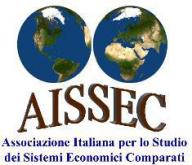by Xieshu Wang and Marta Marson, University of Turin and OEET
Newsletter n. 14| December 2019 - Download PDF
Like the previous one this issue of Emerging Economies includes contributions presented at the 5th Workshop organized by OEET and AISSEC at the Department of Economics and Statistics “Cognetti de Martiis” of the University of Turin on 3rd and 4th of October 2019, around the topic of “Trade Wars and Global Crises: The Outlook for Emerging and Advanced Countries”.
In light of the escalating trade tensions, the workshop invited scholars and practitioners to reflect on how the changing geopolitical dynamics are impacting the trend of international exchanges, the structure of global value chains, and the economic outlooks of both developed and developing economies. This issue presents three contributions on international trade and investment agreements (and bans) in their relationship with investment decisions by nations and firms. The contributions offer insights on this relationship, on the extra-economic effects of agreements and bans, and on alternative means, other than treaties, for the promotion of foreign investments.
We start with M. Blanga-Gubbay and M. Hennicke who analyse the effects of the shock to U.S. trade policy introduced by the non-ratification of the Trans-Pacific Partnership (TPP) after the unexpected election of Donald Trump in the 2016 U.S. presidential election. They provide empirical evidence that stock prices of companies which lobbied in favour of the TPP underperformed after the election, pointing out the role of corporate lobbying in the negotiation of trade agreements and in their outcomes.
Mazzoni shows how the effects of a trade ban can go beyond the economic domain and encompass important environmental concerns, like in the case of Qatar with the 2017 trade ban imposed by Arab countries. While negative results on trade flows were only temporary, as new trade routes were opened and new trade relations developed, the environmental implications of the government programs for decreasing dependence from foreign food imports have a potential long-term impact on the water resources of the country.
Last, L. Benfratello, A. D’Ambrosio and A. Sangrigoli assess the drivers of Sino-African investments and how they differ between Chinese and non-Chinese FDI to Africa at the industry level. They find that Chinese investors react less to the presence of Bilateral Investment Treaties, while they seem to rely on a whole country-level system where they are part of a broader strategy aimed to expand China’s presence in Africa via multiple channels. This involves an important role of State-owned enterprises and the direct engagement of the Chinese government, supplying capital under different forms and on ties and diplomatic relationships with African business and political actors, to increase China’s “soft power” in the continent.









